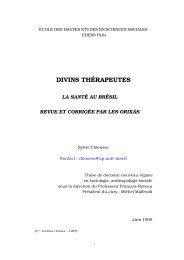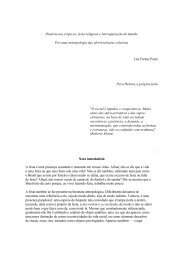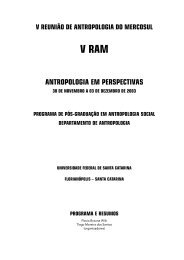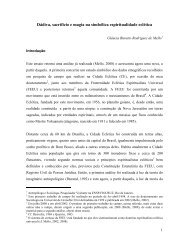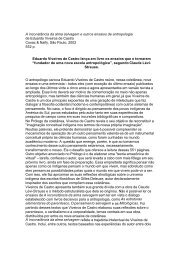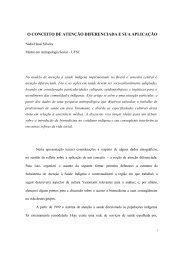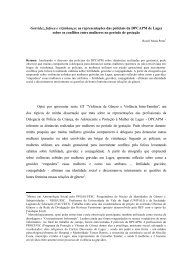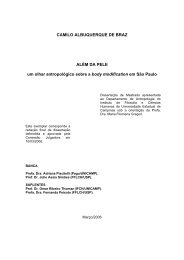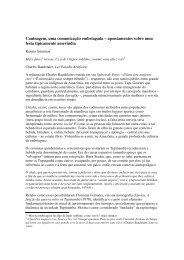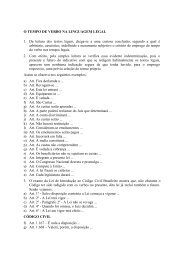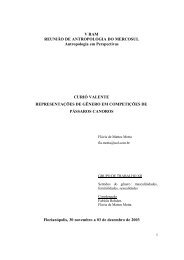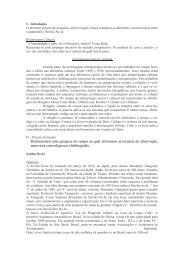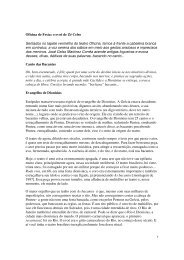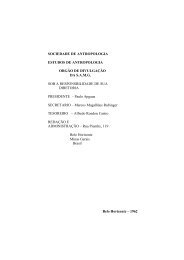Parentesco e aliança entre os Kalapalo do Alto Xingu - Comunidade ...
Parentesco e aliança entre os Kalapalo do Alto Xingu - Comunidade ...
Parentesco e aliança entre os Kalapalo do Alto Xingu - Comunidade ...
You also want an ePaper? Increase the reach of your titles
YUMPU automatically turns print PDFs into web optimized ePapers that Google loves.
Aguaruna kin classification is based on a perfectly clear and exhaustive distinction between<br />
affinity and consanguinity – but not between affines and consanguines; this distinction suffices<br />
to account for all of the oddities of the vocabulary. Furthermore, this variant always defines<br />
marriage in terms of past and future unions, with a view to replicating an alliance (…). From<br />
this standpoint, the Aguaruna variant corresponds perfectly to the spirit if not the letter of the<br />
Dravidian model as defined by Dumont. (TAYLOR, op. cit., p. 208)<br />
Segun<strong>do</strong> Taylor, o sistema aguaruna seria um sistema dravidiano operan<strong>do</strong> por meio<br />
de uma “fórmula rica”, isto é, estrutura<strong>do</strong> a partir d<strong>os</strong> <strong>do</strong>is princípi<strong>os</strong> fundamentais destes<br />
sistemas, mas que <strong>os</strong> colocaria em movimento a partir de fórmulas mais “complexas”, como a<br />
a<strong>do</strong>ção de cálcul<strong>os</strong> iroqueses de cruzamento e a consangüinização d<strong>os</strong> cruzad<strong>os</strong> em G Ø :<br />
(...) in certain contexts, the presence of a limited but specific vocabulary for affines may not be<br />
the mark of an incipient ‘Iroquois system’ but simply the product of a Dravidian logic working<br />
under the constraints of cl<strong>os</strong>e kindred exogamy. In the same way, the presence of a<br />
‘Hawaiian’-type G 0 terminology may be, rather than an indication of transmition toward a<br />
‘complex’ system, the outcome of a perfectly elementary Dravidian alliance structure<br />
reproducing en<strong>do</strong>gamous cognatic kindreds who think themselves in terms of consanguinity.<br />
(TAYLOR, op. cit., p. 209)<br />
Sistemas de <strong>aliança</strong> como o d<strong>os</strong> Aguaruna, de casamento <strong>entre</strong> filh<strong>os</strong> de prim<strong>os</strong><br />
cruzad<strong>os</strong> de sexo op<strong>os</strong>to propiciad<strong>os</strong> pela transmissão da afinidade através de cálcul<strong>os</strong><br />
iroqueses de cruzamento, seriam o que Viveir<strong>os</strong> de Castro (1998, p. 357) chamou de “Type B<br />
restricted exchange systems”. Segun<strong>do</strong> ele (Ibid., p. 356), sistemas deste tipo seriam<br />
equivalentes a trocas de irmãs repetidas em gerações não-consecutivas, e por seu caráter ego-<br />
centra<strong>do</strong> seriam sistemas de troca multibilateral, no qual cada “unidade” vê todas as outras<br />
distribuídas como afins reais ou potenciais, de mo<strong>do</strong> que em um sistema deste tipo a<br />
circularidade dravidiana desaparece e aliad<strong>os</strong> de aliad<strong>os</strong> podem ser, também, aliad<strong>os</strong> de Ego.<br />
Se um sistema de <strong>aliança</strong> operante sob uma lógica dravidiana e com terminologia<br />
iroquesa é concebível, seria p<strong>os</strong>sível então pensar <strong>os</strong> sistemas de parentesco xinguan<strong>os</strong> como<br />
sen<strong>do</strong> cas<strong>os</strong> de “Type B restricted exchange systems”?<br />
101



